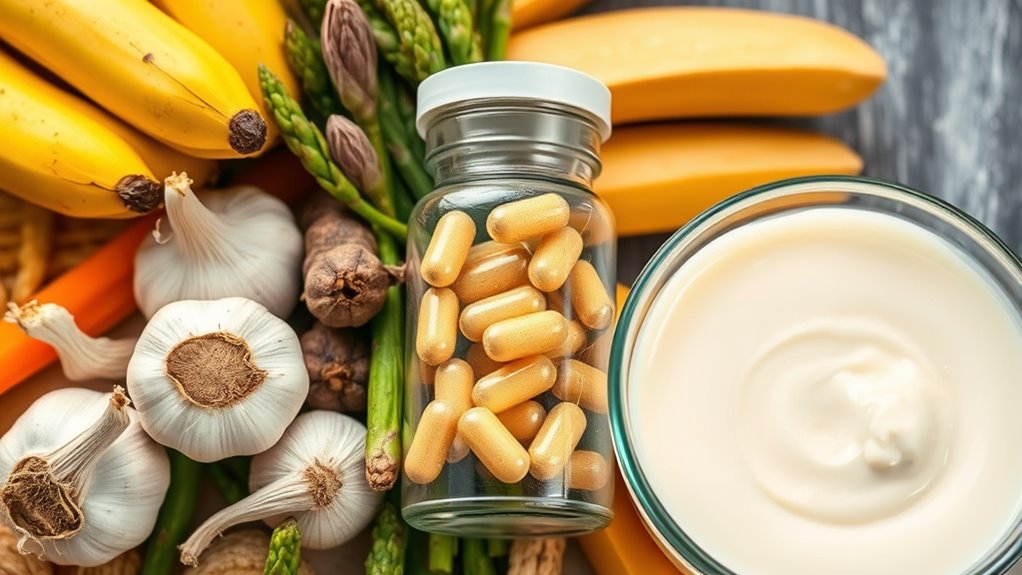Prebiotics and probiotics work together to improve gut health; prebiotics are non-digestible fibers that feed beneficial bacteria, helping them grow and stay active, while probiotics are live bacteria or yeasts that add new beneficial strains directly to your gut. By supporting each other’s functions, they create a balanced environment essential for digestion and overall health. Want to discover how to combine these for maximum benefit? Keep going to find out more.
Key Takeaways
- Prebiotics are non-digestible fibers that feed beneficial gut bacteria, promoting their growth and maintaining a healthy microbiome.
- Probiotics are live beneficial bacteria and yeasts that directly add strains to improve gut diversity and function.
- Prebiotics support probiotics by creating an environment for beneficial bacteria to thrive and multiply.
- Consuming both prebiotics and probiotics together enhances overall gut health more effectively.
- While prebiotics nourish, probiotics directly introduce beneficial microbes into the gut ecosystem.

When it comes to supporting gut health, many people wonder whether prebiotics or probiotics are more effective. Honestly, there’s a lot of confusion out there, often fueled by gut health myths that can make it hard to know what truly works. Some believe that simply eating yogurt or taking supplements automatically improves digestion, but it’s more nuanced than that. To really optimize gut health, understanding the roles of prebiotics and probiotics is vital, especially when considering dietary sources.
Prebiotics are fundamentally the food for your gut bacteria. They’re non-digestible fibers found in plant-based foods that promote the growth of beneficial bacteria. When I first started learning about gut health, I realized many people overlook the importance of these dietary sources. Foods like garlic, onions, leeks, asparagus, bananas, and whole grains are rich in prebiotics. Incorporating these into my diet seemed simple enough, but I was surprised to discover how powerful they can be in shaping my gut microbiome. It’s tempting to think that taking probiotic supplements alone will do the trick, but without a steady supply of prebiotics, those beneficial bacteria don’t thrive or multiply as effectively. That’s why diet is such a key piece of the puzzle.
Prebiotics fuel your gut bacteria, essential for a healthy microbiome and effective probiotic benefits.
On the other hand, probiotics are live bacteria and yeasts that can directly add beneficial strains to your gut. You might think that consuming probiotic-rich foods like yogurt, kefir, sauerkraut, or kimchi automatically guarantees gut improvement. While they do provide good bacteria, their effects depend on the strains present and how well they survive your digestive process. Supplements can offer specific strains in higher quantities, but I’ve learned that they’re only part of the solution. You need a healthy environment in your gut, which is where prebiotics come in—feeding and maintaining those beneficial bacteria.
There’s a common gut health myth that simply popping a probiotic pill or eating probiotic foods will fix all gut issues. But the reality is more complex. The effectiveness of probiotics depends on the existing balance of your gut microbes and whether your diet supports their growth. Dietary sources of prebiotics help create that supportive environment. So, in my experience, the best approach combines both: consuming prebiotic-rich foods to nourish your gut bacteria and probiotic foods or supplements to directly introduce beneficial strains. That way, you’re not just adding bacteria, but creating the perfect environment for them to thrive. Understanding this balance has been eye-opening, and it’s changed the way I approach my gut health.
Frequently Asked Questions
Can Prebiotics and Probiotics Be Taken Together Effectively?
Yes, I believe prebiotics and probiotics can be taken together effectively. They create synergistic effects by supporting gut health more all-encompassing. To maximize benefits, I suggest paying attention to supplement timing—taking prebiotics first to nourish the good bacteria, then probiotics afterward. This approach helps your gut microbiome thrive, enhancing digestion and overall wellness. Combining them thoughtfully can be a powerful step toward better gut health.
Are Prebiotics Suitable for People With Allergies?
Imagine your immune response as a delicate garden; prebiotics are like gentle rain helping your gut flourish. For those with allergies, prebiotics can be suitable, but it’s essential to manage allergies carefully. They support immune function and may reduce inflammation. Still, I recommend consulting a healthcare professional before adding prebiotics to your allergy management plan, ensuring your gut’s garden thrives without unintended weeds.
How Long Does It Take to See Benefits From Probiotics?
I usually see benefits from probiotics within a few days to a couple of weeks. It depends on your gut microbiome and immune support needs, as everyone’s response varies. When I take probiotics regularly, I notice improved digestion and energy levels fairly quickly. Consistency is key, and giving your gut some time helps the probiotics establish and support your immune function effectively.
Do Prebiotics Cause Any Digestive Discomfort?
Prebiotics can sometimes cause digestive reactions like bloating or gas, especially if you start with too high a dosage. I’ve found that small amounts usually do the trick without discomfort, but jumping in too fast can lead to unnecessary upset stomachs. It’s all about listening to your body and adjusting the dosage carefully—trust me, a gentle start makes a huge difference in avoiding digestive discomfort.
Are All Probiotics Equally Effective for Gut Health?
Not all probiotics are equally effective for gut health because strain efficacy varies, meaning some strains work better for certain issues than others. Additionally, dosage variability can impact results, so taking the right amount matters. I recommend choosing probiotics with well-researched strains and appropriate doses tailored to your needs, rather than assuming all products provide the same benefits. Always consult a healthcare professional for personalized advice.
Conclusion
Did you know that over 70% of your immune system resides in your gut? Whether you choose prebiotics or probiotics, both play essential roles in supporting your health. Prebiotics fuel the good bacteria, while probiotics introduce beneficial microorganisms directly. By understanding their differences, you can make smarter choices for your gut health. So, why not incorporate both into your diet? Your gut—and your overall well-being—will thank you!









